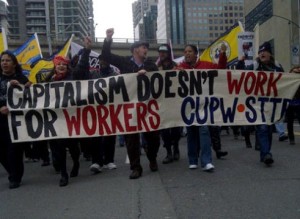New Socialist has invited a number of activists and writers to offer their thoughts on worker organizing and the labour movement today. We begin the series with this contribution from Cindy McCallum Miller.
In 1982, I started working at Canada Post in Banff Alberta, automatically becoming a member of the Canadian Union of Postal Workers (CUPW). A year after CUPW’s 1981 six-week national strike that won paid maternity leave, that victory was still part of the public discourse. The union was militant, its leadership was fearless, and I was nervous because this was my first experience with trade unionism.
I wasn’t long out of high school when I started working as a casual employee in that small-town post office. My education about the history of Canada’s working class was painfully deficient. For years I was spoon fed the drippings of capitalism, seasoned with anti-union rhetoric and complacency, and ingested it without question. Militancy was left to the hands of political radicals and they were dangerous. Best keep my head down and avoid controversy.
The leader of my union was Jean-Claude Parrot, and the only reference I had was that he went to jail in 1978 for defying the government. In my naiveté, the ones who went to jail were guilty of a crime, so I wondered how this criminal could lead a union. My curiosity compelled me to delve into the record of the organization I now belonged to. After reviewing the union’s history from the inside perspective, I came to the conclusion that I had been duped my whole life by the combination of corporate media and the education system. I discovered unknown struggles, unreported injustices, and benefits I inherited because of the determination and courage of my predecessors. I was inspired to contribute to that movement and build on the foundation they laid.
Thirty-five years ago, the public either despised or loved Parrot, but there was no doubt that his was a familiar name because he was a labour leader who got results. He was among a handful of visionaries who refused to accept the prevailing limits for his membership or society, and we were proud to stand with him.
In contrast, today’s labour leaders are virtually invisible to the media and, consequently, the public. Ask a rank-and-file union member to name their national leader or the President of the Canadian Labour Congress (CLC), or for that matter, ask them what the CLC does, and you are likely to get a blank stare. The elimination of labour reporters and the rise of all things business in traditional media sources ensured labour’s fade from public view. The reliance on legal processes instead of worker mobilization ensured labour’s fade within its own ranks. With the exception of small groups of committed activists, and occasional public campaigns, labour is no longer a movement. It has degenerated into a bureaucracy, with uncertain relevance.
The 2017 appointment of CLC President Hassan Yusseff to the Trudeau government’s NAFTA Advisory Council, amidst a slough of corporate apologists and political partisans, was touted as a breakthrough for the political legitimacy of organized labour. Some saw it as an opportunity to have working-class priorities included in the renegotiated corporate bill of rights NAFTA represents and which the labour movement once strenuously opposed. Other, more critical observers, saw this as a politically expedient move by the government to appear inclusive and court support, while really protecting the status quo. The labour movement felt no need to focus the membership on what is at stake with NAFTA (as well as with the Canadian-European Union Comprehensive Economic and Trade Agreement and the Trans Pacific Partnership) but seemed satisfied with a seat at the table, to watch the elite feast.
The only strength the labour movement has ever had, or will have, comes directly from the will of its members to fight for the wealth it produces. Labour can’t just rely on filing grievances or hiring lawyers to fight our issues in the courts. Leaders must inspire members to draw upon their own courage and rely on each other to demand better; not accept the crumbs provided. This is better for everyone, and not just individuals or specific unions. The status quo maintains poverty, discrimination, environmental destruction and servitude. A strong labour movement, in partnership with social and environmental activists, is our best chance to reclaim what we have lost, and build a world we can all share.
Cindy McCallum Miller was the National Director for CUPW Prairie Region 1996-2008 and is days away from retirement at Canada Post. She lives in Castlegar BC.
Photo: Postal workers marching in Toronto, October 27 2011.


